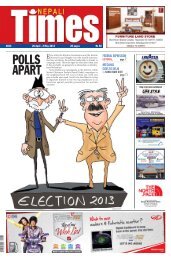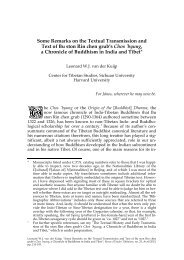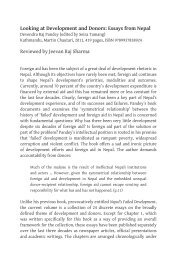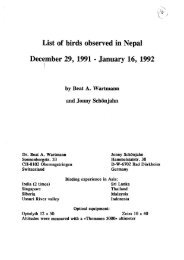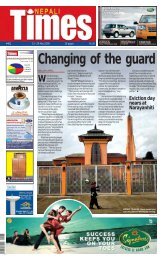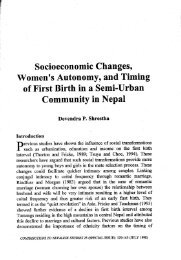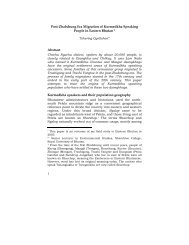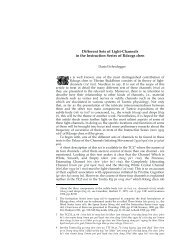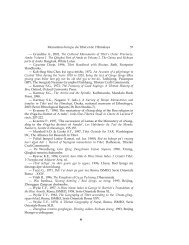You also want an ePaper? Increase the reach of your titles
YUMPU automatically turns print PDFs into web optimized ePapers that Google loves.
nation weekly | MAY 30, 2004<br />
BR<br />
the different field of expertise they<br />
(UNHCR) possess,” says Subba, chairman<br />
of the Bhutanese Refugee Representatives<br />
Repatriation Committee<br />
(BRRRC).<br />
UNHCR must stay, he insists. “Bilateral<br />
donors cannot be a substitute to<br />
UNHCR nor can the UN agency<br />
unprecedentedly delegate its mandate.”<br />
Apart from legal protection, the refugees<br />
in the camps receive a wide range of assistance<br />
from the UN agency like daily<br />
ration, clothes, and materials to build<br />
homes, medical aid and education. As a<br />
part of phase-down, these facilities will<br />
be scrapped.<br />
Last year, refugees had to face serious<br />
problems of readjustments when<br />
UNHCR shut down child play centers<br />
and kindergartens, deleted turmeric<br />
powder from the ration list and reduced<br />
funding for higher secondary education.<br />
UNHCR says it spends $120 per refugee<br />
annually in the camps.<br />
Much like the refugee leaders, some<br />
foreign diplomats in Kathmandu whose<br />
interest and consent the agency is counting<br />
on, do not appear quite enthusiastic<br />
about the UN pullout. A senior U.S.<br />
diplomat earlier this month expressed<br />
disbelief (in an email message to this<br />
reporter) over directly involving bilateral<br />
donors in the transition of the assis-<br />
BR<br />
tance. “...I don’t believe USAID or any<br />
other bilateral donors will be involved<br />
in the transition of assistance from<br />
UNHCR—they plan to continue assistance<br />
programs through UN agencies.”<br />
The diplomats also expressed uncertainty<br />
over the time-frame of the transition<br />
process.“…I don’t know when<br />
UNHCR actually intends to begin the<br />
phase out, although I assume we will be<br />
briefed once they have a concrete plan.”<br />
The news of phase-out and transition<br />
has already created a sense of panic<br />
among refugees here. Sources say the<br />
newly elected Camp Secretaries and<br />
Members have threatened to resign en<br />
masse as a symbolic protest.<br />
It’s been an interesting policy shift<br />
for the UN refugee agency. From “We<br />
wouldn’t pull out of the camps till a durable<br />
solution is found” six months ago<br />
to a drastically changed—”We might” and<br />
now “We will.” It all started last fall.<br />
When laying out his plan for<br />
Bhutanese refugees before an executive<br />
committee meeting in Geneva on 29 September<br />
2003, UN High Commissioner<br />
for Refugees, Rudd Lubbers had said that<br />
his office would promote self-reliance<br />
projects to facilitate local integration and<br />
gradual phasing-out of UNHCR’s direct<br />
involvement.<br />
“I have decided to take three key<br />
measures,” Lubbers said, “first, since the<br />
Nepalese government has offered to<br />
settle those [refugees] willing to remain,<br />
and grant them citizenship, my office<br />
will promote self-reliance projects to<br />
facilitate their [local] integration. Second,<br />
my office will support resettlement<br />
initiatives for vulnerable cases.<br />
Third…we will not promote returns.”<br />
The funds saved from the phase-out<br />
here is likely to be directed to Iraq, Afghanistan<br />
and the Horn of Africa, all<br />
troubled spots. In a statement issued in<br />
March, the UNHCR said it was<br />
“downsizing its assistance” for<br />
Bhutanese refugees as it has “other areas<br />
to focus on.”<br />
Although observers here agree that<br />
the self-reliance projects might be the<br />
best option for a dignified life, in light<br />
of the refugee stalemate, they however<br />
say that a graceful homeward journey<br />
might become more difficult once the<br />
camps have been dismantled.<br />
With TIKU GAUCHAN in Kathmandu<br />
27




